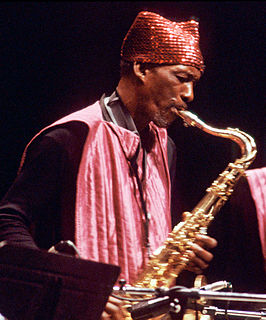
Lanquidity is a studio album by American jazz musician Sun Ra originally released in 1978 by Philly Jazz and reissued on HDCD by Evidence Records in 2000.

Super-Sonic Jazz is an album by Sun Ra, recorded in 1956 at RCA Studios, Chicago. Super-Sonic Jazz was the first album to be released on Saturn records, the label run by Sun Ra and Alton Abraham, and was one of only three albums by Sun Ra to have been available in the 1950s.

Featuring Pharoah Sanders and Black Harold is a jazz album by Sun Ra, recorded live in 1964, but not released until 1976, on Ra and Alton Abraham's El Saturn label.

Blue Delight is a jazz album by free jazz pioneer Sun Ra.
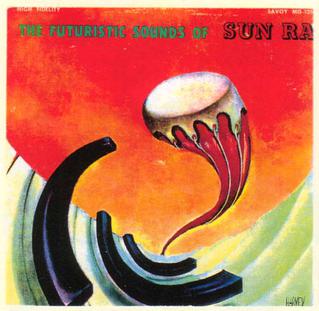
The Futuristic Sounds of Sun Ra is an album by the American jazz musician Sun Ra and his Arkestra, recorded October 10, 1961 for the Savoy label.

Bad and Beautiful is an album by the American jazz musician Sun Ra and his Arkestra. Recorded in 1961 in New York City at the Choreographers' Workshop, 414 W. 51st St., the album was the second to be recorded in New York by the Arkestra after leaving Chicago, but would remain unreleased until 1972. The album is considered to represent an important transition between the big band approach of the Chicago recordings, and the more 'outside' approach of Ra's smaller bands recorded later in the decade:
'Aside from "Exotic Two," the tunes are split between standards and blues originals, but there are indications of the direction the Arkestra would take throughout the '60s. "Search Light Blues" has some interesting percussion accents finding their way into the arrangement, and "Exotic Two" alludes more clearly to the percussion-heavy sound that dominated many of the '60s recordings. Sun Ra plays piano exclusively on this recording, and Gilmore gets lots of room to shine. A significant transitional LP, this is probably the last "inside" record the Arkestra would record as they forged new sonic paths into the mid-'60s.' Sean Westergaard, All Music Guide link

Art Forms of Dimensions Tomorrow is an album by the American jazz musician Sun Ra and his Solar Arkestra. Often considered the first of Ra's 'outside' recordings, the album was the first to make extensive use of a discovery by the Arkestra's drummer and engineer Tommy Hunter:
'Art Forms of Dimensions Tomorrow.... contained "Cluster of Galaxies" and "Solar Drums", two rhythm section exercises with the sound treated with such strange reverberations that they threatened to obliterate the instruments' identity and turn the music into low-budget musique concrète. While testing the tape recorder when the musicians were tuning up one day, Hunter had discovered that if he recorded with the earphones on, he could run a cable from the output jack back into the input on the recorder and produce massive reverberation:
"I wasn't sure what Sun Ra would think of it... I thought he might be mad - but he loved it. It blew his mind! By working the volume of the output on the playback I could control the effect, make it fast or slow, drop it out, or whatever." [Tommy Hunter]
'By the 1950s commercial recording companies had developed a classical style of recording which assured that the recording process itself would be invisible... but Sun Ra began to regularly violate this convention on the Saturn releases by recording live at strange sites, by using feedback, distortion, high delay or reverb, unusual microphone placement, abrupt fades or edits, and any number of other effects or noises which called attention to the recording process. On some recordings you could hear a phone ringing, or someone walking near the microphone. It was a rough style of production, an antistyle, a self-reflexive approach which anticipates both free jazz recording conventions and punk production to come.' John F Szwed

For the song by Harold Arden and Ted Koehler, see When the Sun Comes Out
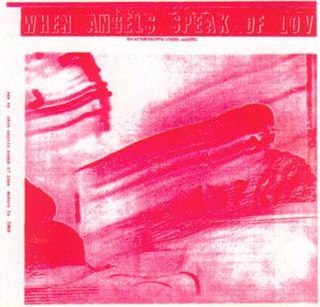
When Angels Speak of Love is a music album by the American Jazz musician Sun Ra and his Myth Science Arkestra. Originally released in 1966 on Sun Ra's own Saturn label, the record would have only been available by mail order or sold at Arkestra concerts, and is one of the rarest of all Saturn releases. The record was reissued on compact disc by Evidence in 2000.

Strange Strings is an album by the American Jazz musician Sun Ra and his Astro Infinity Arkestra. Recorded in 1966, the album was released by 1967 on Sun Ra's own Saturn label. The record was reissued on compact disc by Atavistic in 2007.
'Strange Strings is a somewhat legendary album from the mid-'60s. "Worlds Approaching" is a great tune, anchored by a bass ostinato and timpani and featuring several fantastic solos... Off and on throughout the tune, Bugs Hunter applies near-lethal doses of reverb, giving the piece a very odd but interesting sound. "Strange Strings" is one of those songs that is likely to inspire some sort of "you call that music?" comment from your grandmother, or even from open-minded friends. It sounds like they raided the local pawnshop for anything with strings on it, then passed them out to the bandmembers. It's difficult to tell if some of these instruments have been prepared in some way, or if they're simply being played by untutored hands. There are also lots of drums and some viola playing from Ronnie Boykins that is also treated heavily with reverb. Despite the cacophony, there is a definite ebb and flow to the piece and what seem like different movements or themes. Whatever you think of the music contained, there's no denying that it produced some of the most remarkable sounds of the mid-'60s. If you don't like "out," stay clear of this one.' Sean Westergaard

Nothing Is is a live album by American composer, bandleader and keyboardist Sun Ra recorded in 1966 and released on the ESP-Disk label in 1970. In 2010 ESP-Disk released an expanded 2CD edition, restoring the full concert on disc one and adding part of the second set and some tracks from the sound check on disc two.

The Best of John Coltrane is a 1970 compilation album released by Atlantic Records collecting recordings made by jazz saxophonist John Coltrane. The album was released shortly after his death as a part of the "Atlantic Jazz Anthology"—a series of greatest hits compilations for Atlantic jazz artists—and features performances from his brief period recording for Atlantic with new liner notes by jazz journalist Nat Hentoff.

Live from Soundscape is a live album by jazz composer, bandleader and keyboardist Sun Ra and his Arkestra recorded in New York City in 1979 and released on the Japanese DIW label in 1994. Initial pressings of the album contained a bonus CD featuring a lecture by Sun Ra.

Some Blues But Not the Kind That's Blue is an album by jazz composer, bandleader and keyboardist Sun Ra and his Arkestra recorded in 1977 and originally released on Ra's Saturn label in 1977 and rereleased on CD on Atavistic's Unheard Music Series in 2008.

Other Voices, Other Blues is a double album by jazz composer, bandleader and keyboardist Sun Ra and his Quartet recorded in Italy in 1978 and originally released on the Italian Horo label.
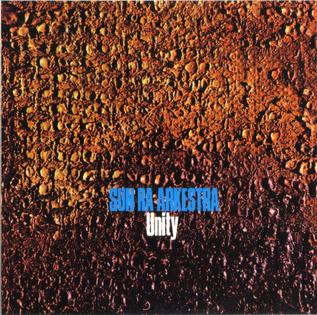
Unity is a live double album by jazz composer, bandleader and keyboardist Sun Ra and his Arkestra recorded in 1977 and originally released on the Italian Horo label.

Sleeping Beauty is an album by jazz composer, bandleader and keyboardist Sun Ra and his Intergalactic Myth Science Solar Arkestra recorded in 1979 and originally released on Ra's Saturn label and rereleased on CD on Art Yard in 2008.

Strange Celestial Road is an album by jazz composer, bandleader and keyboardist Sun Ra and his Arkestra recorded in New York in 1979 and originally released on the Rounder label.
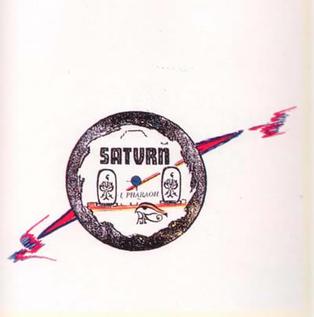
I, Pharaoh is a live album by composer, bandleader and keyboardist Sun Ra and his Arkestra recorded around 1979 and released on his El Saturn label.

Of Mythic Worlds is an album by composer, bandleader and keyboardist Sun Ra and his Arkestra recorded around 1979 and released on his El Saturn label.



